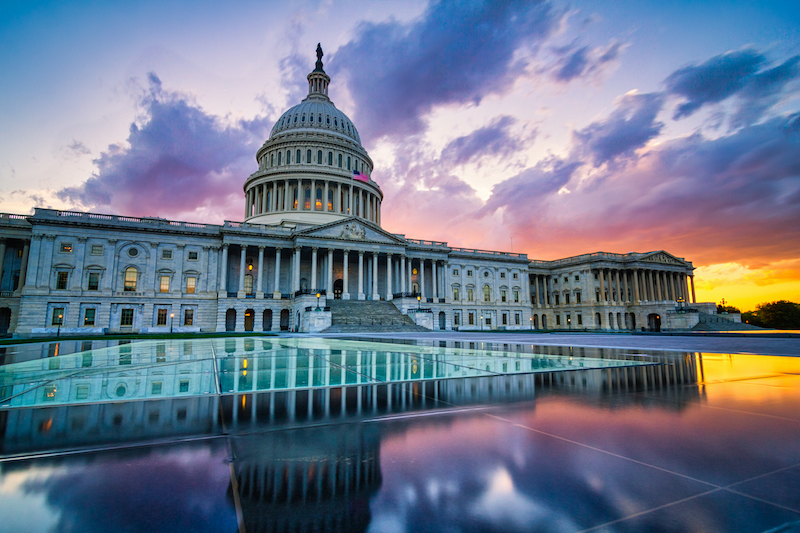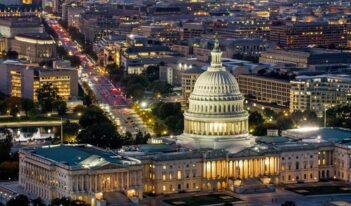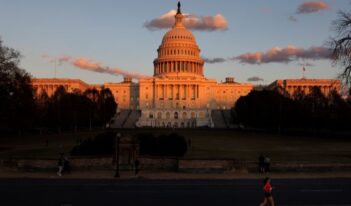
The Regulatory Review highlights the top regulatory stories written by our staff in 2020.
The Regulatory Review is pleased to highlight the top essays from 2020 authored by our staff. These essays, which qualify for this list based on the number of page views, are arranged below in alphabetical order by last name of author.
Are Subprime Auto Loans Driving the Next Financial Crisis?
January 23, 2020 | James Alford
In a recent article, law student Andrew Schmidt of the University of California, Berkeley, School of Law urges state officials, lawmakers, and regulators to intervene in the car credit market to curb lenders’ ability to issue subprime loans.
Meatpackers Piggyback on Department of Agriculture Deregulation
January 9, 2020 | Alana Bevan
The U.S. Department of Agriculture issued a new pork processing rule in September 2019, eliminating the 18-hog cap on line speed and formalizing the first change to swine processing standards in over 50 years.
Proposed EPA Rule May Permit More Toxic Water Pollution
February 4, 2020 | Joseph DeQuarto
The U.S. Environmental Protection Agency recently proposed a rule that could weaken an Obama-era regulation that imposed more stringent wastewater restrictions—commonly referred to as effluent limitations—on coal burning power plants in an effort to reduce the amounts of harmful contaminants entering Americans’ drinking water.
Can Regulating Surrogacy Prevent Statelessness?
March 26, 2020 | Meghan Downey
In a recent note, attorney Laura Rose Golden argues that the U.S. federal government should address the potential for statelessness through surrogacy through a revised regulatory scheme.
The Trump Administration’s New Title IX Rule
May 20, 2020 | Meghan Downey
The Trump Administration’s Title IX rule has finally arrived. In addition to establishing a new standard for administrative enforcement against noncompliant institutions, the rule sets forth requirements for university grievance procedures when a person reports experiencing sexual assault or harassment.
Explaining the Supreme Court’s DACA Decision
July 7, 2020 | Meghan Downey and Adam Garnick
The U.S. Supreme Court’s decision will have enormous practical consequences for recipients of protected status under the Deferred Action For Child Arrival program, and for immigration policy more broadly—but the case itself focuses on several discrete administrative law issues.
Your COVID-19 Immunity Papers, Please
May 5, 2020 | Milad Emamian
Policymakers and scholars are considering the possibility of creating immunity certificate programs that would exempt people who have recovered from COVID-19 from societal restrictions, such as limits on public gatherings and operating businesses.
Determining the Safety of CBD Products
January 7, 2020 | Marissa Fritz
The U.S. Food and Drug Administration (FDA) has warned the public that CBD products have not been approved by the agency and can expose consumers to serious health risks. Due to FDA’s limited data, the agency said it cannot conclude that CBD products are safe.
Drug Approval During a Public Health Crisis
February 11, 2020 | Marissa Fritz
The U.S. Food and Drug Administration recently approved a vaccine that could contain the current Ebola outbreak and be used as a model for approving drugs during a future public health emergency.
Resolving Regulatory Confusion Over Medical Software
February 27, 2020 | Marissa Fritz
Medical software can save lives, but if left completely unregulated, patients could be misdiagnosed or given improper treatment. The U.S. Food and Drug Administration recently adopted a “risk-based” framework to regulate medical software.
Encouraging Competition Through Generic Drugs
April 22, 2020 | Marissa Fritz
The U.S. Food and Drug Administration’s new Drug Competition Action Plan encourages drug manufacturers to develop generic versions of brand name drugs. But the pharmaceutical industry has needed additional guidance to navigate the generic drug approval process.
Regulating the Use of Genetic Information
August 27, 2020 | Marissa Fritz
In a recent article, Michael Dohn of Belmont University College of Law argues that federal law under The Genetic Information Nondiscrimination Act of 2008 needs to be expanded to prevent genetic information from being used to determine placement in schools as well as eligibility for life, disability, and long-term care insurance.
Regulating Backyard Breeders
March 12, 2020 | Grace Gale
Irresponsible behavior by dog owners can cause hundreds of thousands of healthy dogs to be put to death each year, according to a recent article by Lisa Milot of the University of Georgia School of Law. Unfortunately, existing breeding regulations are not up to the task of controlling the harms from this irresponsible behavior.
Federal Agencies’ Westward Expansion
January 30, 2020 | Emily Galik
Two U.S. Senators introduced legislation that would move the headquarters of federal agencies out of Washington, D.C. The bill follows efforts by the Trump Administration to move the U.S. Department of Agriculture to Kansas City.
Reforming Blood Donation in the Age of COVID-19
May 21, 2020 | Emily Galik
The COVID-19 pandemic has pushed the U.S. Food and Drug Administration to modernize regulatory guidance born of an earlier global epidemic: HIV/AIDS.
Proposal to Import Prescription Drugs Faces Criticism
April 9, 2020 | Sophia Gaulkin
The high price of many prescription drugs in the United States remains a top concern for American voters. Candidates and legislators from both parties have pushed for measures to lower prices, but one strategy in particular faces increasingly fierce criticism: a proposed rule by the FDA to allow the importation of certain prescription drugs from Canada.
Calls for Regulatory Approval of Edible Insects
May 6, 2020 | Sophia Gaulkin
Insects’ high quantity of protein, vitamins, and minerals could fill the gap left by U.S. meat producers during the COVID-19 crisis. In the United States, however, federal regulation of insects for human consumption has largely been characterized by regulatory inaction.
The Future of Maine’s Food Sovereignty Movement
July 14, 2020 | Sophia Gaulkin
For nearly a decade, Maine has been experimenting in radical self-governance over food production. Despite the food sovereignty movement’s growth and success, the ever-present potential of federal preemption threatens its long-term viability.
Current Law Helps Shield Attorney General From Independent Review
March 3, 2020 | Allie Gottlieb
In the wake of the controversy over President Donald J. Trump’s and U.S. Attorney General William Barr’s alleged interference in the prosecution of Roger Stone, the U.S. Congress should consider implementing a simple reform that has received considerable bipartisan support for years. The proposed reform would authorize the U.S. Department of Justice’s Inspector General to investigate allegations of misconduct of the kind surrounding Attorney General Barr.
Persuading for Privacy
March 19, 2020 | Allie Gottlieb
If Congress is to pass federal privacy legislation, Democrats and Republicans must find agreement on two issues over which their two competing bills diverge: preemption and private rights of action.
COVID-19, Domestic Violence, and Guns
April 8, 2020 | Allie Gottlieb
As the coronavirus pandemic requires home isolation, victims and survivors of domestic violence find themselves in greater danger. In response, lawmakers have urged congressional leaders to increase funding for domestic violence programs.
Florida’s Unemployment Insurance System Breaks Down Under COVID-19
April 28, 2020 | Allie Gottlieb
Many of the hundreds of thousands of laid-off workers in Florida found themselves unable to apply for unemployment insurance. Many continue to wait for the benefits they are due, weeks after they were first laid off.
Public Health Versus Privacy
May 14, 2020 | Allie Gottlieb
In a viral outbreak, digital contact tracing can be an effective and sometimes necessary public health response. Some privacy advocates worry, however, that any attempt to mandate tracking of the spread of COVID-19 at an individual level using mobile apps threatens privacy and civil liberties.
The Newest Label Coming to a Grocery Store Near You
August 20, 2020 | Edward Hale
After decades of controversy, many genetically engineered foods will require labels in the United States starting in 2022, due to the national bioengineered food disclosure standard adopted by the U.S. Department of Agriculture in 2018.
The Health-Sharing Duck
February 26, 2020 | Simone Hussussian
Health sharing organizations pay monthly fees to spread the risk of incurring medical costs—just like insurance companies do. Yet they are not actually treated under the law like insurance companies.
Will State Public Options Deliver on Health Care Reform?
June 9, 2020 | Simone Hussussian
Amid fierce opposition from congressional Republicans and the health insurance industry—and lackluster support from moderate Democrats—a federal public health insurance option was ultimately stricken from the Affordable Care Act. But where Congress failed to act, states could succeed.
Changing Credentials in College Accreditation
February 25, 2020 | Daniel Kees
A recent rule issued by the U.S. Department of Education could create a nationwide explosion of access to brick-and-mortar college campuses and online learning programs. Opponents of the rule argue that the widespread access it will promote carries widespread risks.
Student Loan Disservice?
April 2, 2020 | Daniel Kees
The nonprofit Student Debt Crisis recently filed a lawsuit in federal court against the Consumer Financial Protection Bureau and the U.S. Department of Education arguing that these agencies have “exacerbated” a student loan crisis.
ISIS the Art Dealer
April 13, 2020 | Daniel Kees
Sales of stolen cultural property and art from conflict zones have helped terrorist organizations continue to fund their illegal activities. The ad hoc nature of domestic regulatory oversight and policing gives rise to a need for legislation that can stem the flow of antiquities revenue going to ISIS, which some estimates place as high as $100 million.
Learning in the Age of Social Distancing
May 12, 2020 | Daniel Kees
The U.S. Department of Education recently released a new proposed rule on distance education that could alter online learning, correspondence, and study abroad programs long after ongoing social distancing practices have ceased. The proposed rule is part of a broader deregulatory push.
Robotic Surgeries Need Regulatory Attention
January 8, 2020 | Damini Kunwar
If a surgery is performed by a robot, who is at fault for surgical mistakes? Medicine is rapidly moving toward a time when robots will perform surgeries autonomously. Under today’s regulatory framework, this future would be filled with legal challenges.
A Proposed Rule to Secure the Digital Economy
February 5, 2020 | Damini Kunwar
The U.S. Department of Commerce recently proposed a rule that would allow the agency to review information and communications technology and services that have connections to a foreign adversary.
Increasing Organ Donation in the United States
February 19, 2020 | Damini Kunwar
The U.S. Department of Health and Human Services has issued two proposed rules aimed at increasing the number of organs available for donation by changing the system of donation approval, reducing the waste of usable organs, and providing financial assistance to potential donors.
Turning the Senate Blue and the Cabinet Red
November 24, 2020 | Brinna Ludwig
If the U.S. Senate remains in obstructionist hands, President-Elect Joe Biden’s best bet will be to try to take control of the Senate by sacrificing a couple of positions in his Cabinet to the Republican Party.
FDA Announces Age Change for Tobacco Sales
February 13, 2020 | Kate Mancuso
FDA recently declared on its website that “it is now illegal” to sell any tobacco product “to anyone under 21.” But the change was not expected to be implemented for several months, and so far no rules or guidance have been published to put the change into effect.
Rethinking the Regulation of Dog Breeds
April 23, 2020 | Kate Mancuso
Proponents of breed-specific legislation argue that certain breeds are inherently dangerous. But opponents of breed-specific legislation maintain that breed bans cause significant negative impacts on good dogs and good people, with no measurable benefit to public safety.
Reflecting on RBG’s Legacy
September 21, 2020 | Lynn McDonough and Larissa Morgan
In her own life, Justice Ginsburg succeeded in breaking through many barriers to equality—and she dedicated her career as a lawyer, judge, and Justice to breaking down barriers for others.
An Epidemic Meets a Pandemic
April 1, 2020 | Larissa Morgan
During this period of social distancing, some addiction treatment providers are turning to telemedicine, the use of electronic systems to provide care to patients in remote locations. To ease providers’ ability to offer telehealth services to patients with opioid addiction, the U.S. Drug Enforcement Administration recently issued guidance that allows practitioners to prescribe certain controlled substances remotely.
Planning for the Return of Supersonic Commercial Aviation
January 15, 2020 | Mark Nakahara
The U.S. Federal Aviation Administration has observed that advancements in aircraft technology may make supersonic air transport viable again. The agency has proposed updates to its rule governing the testing and usage of supersonic passenger planes.
The Regulation of American Archaeology
February 12, 2020 | Mark Nakahara
The question of who has the right to artifacts found in the United States depends on a number of factors. Government agencies, Native American tribes, and private property owners may all have a claim to artifacts depending on where they were found.
Deregulating Rail Transportation of Liquefied Natural Gas
March 24, 2020 | Mark Nakahara
A new regulation from the Trump Administration may soon make it easier for U.S. companies to ship large quantities of liquefied natural gas. But the new regulation also carries great risks.
The Continued Grounding of the Boeing 737 MAX
July 16, 2020 | Mark Nakahara
In recent years, the Federal Aviation Administration has begun to delegate some of its regulatory oversight to aircraft manufacturers themselves, providing the opportunity for managers “to push for shortcuts” when facing pressure to get a new aircraft on the market.
Making Social Media Self-Regulation More User-Centered
August 26, 2020 | Mark Nakahara
In a recent paper, Robert Yablon of the University of Wisconsin Law School argues that social media companies should take a more democratic approach to regulating political speech on their platforms.
Remembering and Continuing RBG’s Legacy
October 1, 2020 | Elle Rothermich, Brianna Rauenzahn, Allie Gottlieb, and Meghan Downey
Justice Ginsburg knew that “real change, enduring change, happens one step at a time.” Even when on the losing side, she wrote her striking dissents to shape the future. She inspires us to continue her work toward true equality.
Will FDA Guidance Hasten Testing for COVID-19?
March 19, 2020 | Adam Runkle
The spread of COVID-19 has outpaced the availability of diagnostic test kits. The U.S. Food and Drug Administration (FDA) took emergency action in a recent guidance document that permits the development and use of COVID-19 tests before receiving FDA approval.
FDA Relaxes Rules on Ventilators for COVID-19
April 3, 2020 | Adam Runkle
With intensive care units and emergency departments packed with COVID-19 patients and respiratory ventilators in short supply, the U.S. Food and Drug Administration recently relaxed its regulatory enforcement efforts over the medical device industry.
COVID-19 and the Defense Production Act
April 15, 2020 | Lila Sevener
Members of Congress argue that President Donald J. Trump should use the Defense Production Act more aggressively to force increased production of medical equipment. The Trump Administration has shown reluctance to force companies to produce needed materials under the Act, arguing that companies are stepping up on their own.
Inequalities in Natural Disaster Regulation
January 16, 2020 | Lila Sevener
Professor Brie Sherwin at Texas Tech University School of Law argues that inadequate regulations and procedures both before and after hurricanes disproportionately harm low-income communities and communities of color in the wake of natural disasters.
A Fintech Charter by Another Name
November 30, 2020 | Lucas Siegmund
If the Office of the Comptroller of the Currency (OCC) loses its legal fight to charter non-depository institutions, it will need to rethink how it charters financial technology firms, or “fintechs.” In doing so, the OCC may have more options to charter fintech payments firms than fintech lenders.
Philadelphia Passes Renters’ Right to Counsel
January 22, 2020 | Samuel Whillans
Tenant advocates in Philadelphia celebrated the passage of a law guaranteeing low-income tenants facing eviction the right to an attorney. But they are already pushing for stronger protections.
This page is part of a four-part series, entitled The 2020 Regulatory Year in Review.



